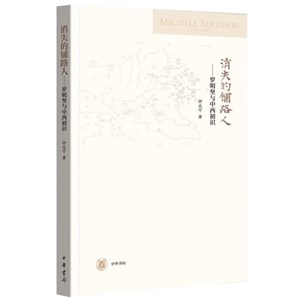‘Disappeared paver’ of Chinese-Western cultural exchanges
Author : LEI HUANJIE Source : Chinese Social Sciences Today 2023-01-03

The Disappeared Paver: Michele Ruggieri and Initial Chinese-Western Cultural Exchanges
The Disappeared Paver: Michele Ruggieri and Initial Chinese-Western Cultural Exchanges, by Zhong Yongning, editor-in-chief of Guangdong People’s Publishing House, selects the Italian Sinologist Michele Ruggieri (1543–1607) as the protagonist, unravelling his life experiences with a clear grasp of the historical context. It portrays a complex and wonderful picture of the early waves of the eastward transmission of Western learning in the Ming (1368–1644) and Qing (1644–1911) dynasties.
The story of Michele was usually overshadowed by the image of Matteo Ricci. Previous studies tend to attribute almost foundational contributions of Chinese-Western cultural exchanges to Matteo, who later successfully entered Beijing, while either ignoring Michele, who created a number of “firsts” in the history of Chinese-Western cultural exchanges, or merely considering him as a foil of Matteo. What role did Michele play in the initial encounters between China and the West? Uncovering and rediscovering this “disappeared paver” constitutes the main purpose of the book.
The book consists of two parts: story and research. The starting point of the story traces back to the Age of Exploration. Zhong delineates the historical details of Michele’s coming to and from China, and his life in China from a global perspective, spanning thousands of miles from East to West. In the research section, the author sheds light on Michele and other pertinent characters, as well as on society at that time.
Michele was not only a pioneer of the eastward dissemination of Western learning, but also a forerunner of the westward spread of Eastern learning. When lobbying in Europe in his later years, he presented a Spanish translation of The Four Books [The Great Learning, The Doctrine of the Mean, The Analects of Confucius, and The Works of Mencius] to the King of Spain. It was the first time Westerners introduced Chinese Confucian classics to Europe in the concept of “the Four Books.” He also compiled Atlas of China, the first atlas of China’s provinces in Western history.
Research on exchanges and mutual learning among civilizations often needs to confront the relationship between micro and macro, avoiding either grand narratives or trivial details. Zhong delves into Michele in tight combination with historical contexts. The protagonist of the book is undoubtedly Michele, but it also touches upon figures of Chinese officials and scholars such as Wang Pan, Chen Rui, and Guo Yingpin. The author writes not only to outline the life story of a Western Sinologist, or simply introduce his foundational contribution to cultural exchanges between China and the West. He attempts to convey a better understanding of the connectivity between individual destiny, political systems, social organizations, and cultural traditions.
Lei Huanjie is from the Institute of Philosophy at the Chinese Academy of Social Sciences.
Ye Shengtao made Chinese fairy tales from a wilderness
Ye Shengtao (1894–1988) created the first collection of fairy tales in the history of Chinese children’s literature...
-
How northern ethnicities integrated into Chinese nation
2023-09-18
-
Mogao caves
2023-09-12
-
Mogao Grottoes as ‘a place of pilgrimage’
2023-09-12
-
Time-honored architectural traditions in China
2023-08-29
-
Disentangling the civilizational evolution of China
2023-08-28
-
AI ethics in science fiction
2023-08-23














 2011-2013 by www.cssn.cn. All Rights Reserved
2011-2013 by www.cssn.cn. All Rights Reserved